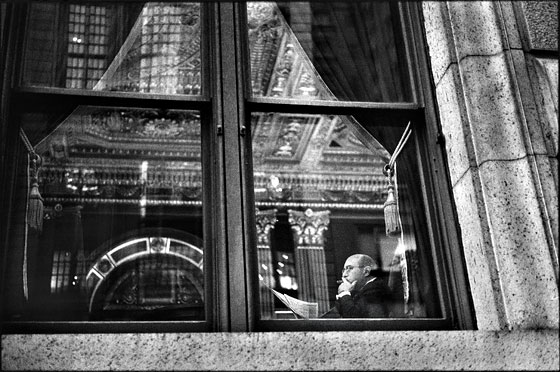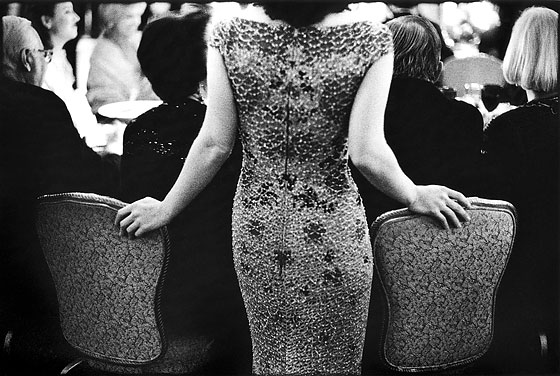
Shortly after 1:30 on the afternoon of March 18, two dozen traders in AIG’s financial-products division stepped away from their Bloomberg terminals and huddled around televisions to watch their boss, CEO Edward Liddy, testify before Congress. There was much at stake. These were the people who received the greater part of $165 million in “retention bonuses” that had suddenly become, to borrow a phrase, toxic.
As the hue and cry to return the money grew, the traders had thought that Liddy would stand up for them. The ruddy-faced, 63-year-old former Allstate CEO, who had been installed by Treasury Secretary Hank Paulson in September, was, if not exactly one of them, at least someone who understood the rules of the game as it had been played—and who understood what they were entitled to under those rules, even if those rules were unspoken. In AIG’s glory years, executives like Joseph Cassano, the former head of financial products, took home more than $300 million. That was the kind of money you couldn’t talk about.
But as Andrew Cuomo stoked public outrage by threatening to release the names of the bonus recipients, it became clear that the game was changing. When AIG employees had arrived at their desks that morning, they found a memo from Liddy asking them to return 50 percent of the money. The number infuriated many of the traders. Why 50 percent? It seemed to be picked out of a hat. The money had been promised, was the feeling. A sacred principle was at stake, along with, not incidentally, their millions.
Everyone on Wall Street is prepared to lose money. Bankers have expressions for disastrous losses: clusterfuck, Chernobyl, blowing up … But no one was prepared to lose money this way. This felt like getting mugged.
Jake DeSantis, a 40-year-old commodities trader at AIG, was an unlikely face of Wall Street greed. Stocky and clean cut, with an abiding moral streak, he’d worked summers for a bricklayer in the shadow of shuttered steel mills outside Pittsburgh; he was valedictorian of his high-school class and attended college at MIT. Compared with the way many of his Wall Street brethren lived, with their Gulfstreams, Hamptons mansions, and fleets of luxury cars, his life wasn’t one to invite scorn. He had canvassed for Obama in Scranton on Election Day and drove a Prius. His division at AIG was profitable. And since joining the company in 1998, he had never traded a single credit-default swap.
Now his boss was selling him out. DeSantis left work that day feeling that his world was falling apart. The next day, the House passed—by a wide margin—a bill that would levy a 90 percent tax on bonuses at firms that were bailed out. The Connecticut Working Families Party planned to bus protesters to the homes of AIG executives in Fairfield County. There were death threats. “It’s been terrifying,” says his wife’s mother, Lynnette Baughman. “It’s like a witch hunt.”
It was in this environment that DeSantis sent his remarkable resignation letter to the New York Times. In the letter, which ran as an op-ed on March 25, he compared himself to a plumber (“None of us should be cheated of our payments any more than a plumber should be cheated after he has fixed the pipes but a careless electrician causes a fire that burns down the house”) and announced that he would quit AIG and donate his bonus to charity. The letter, passionate and wounded and oddly out of touch with ordinary Americans, put a human face on Wall Street’s anger. When DeSantis arrived at the office the morning his letter appeared in the paper, the AIG traders gave him a standing ovation. In some quarters of the press, he was vilified. (As Frank Rich put it in the Times, “He didn’t seem to understand that his … $742,006.40 (net) would have amounted to $0 had American taxpayers not ponied up more than $170 billion to keep AIG from dying.”) But the fracas was useful: DeSantis had succeeded in opening up an honest conversation—as typically emotional and awkward and neurotically charged as is any conversation on the subject—about money, the first this town has had in years.
In a witch hunt, the witches have feelings, too. As populist rage has erupted around the country, stoked by canny politicians, an opposite rage has built on Wall Street and other arenas where the wealthy hold sway. Its expression is more furtive and it’s often mixed with a kind of sublimated shame, but it can be every bit as vitriolic.
“AIG pissed some people off, and now you’re gonna screw everyone on Wall Street?” rails a laid-off JPMorgan vice-president. (Despite the honesty of the conversation, many did not wish to be quoted by name.)

“No offense to Middle America, but if someone went to Columbia or Wharton, [even if] their company is a fumbling, mismanaged bank, why should they all of a sudden be paid the same as the guy down the block who delivers restaurant supplies for Sysco out of a huge, shiny truck?” e-mails an irate Citigroup executive to a colleague.
“I’m not giving to charity this year!” one hedge-fund analyst shouts into the phone, when I ask about Obama’s planned tax increases. “When people ask me for money, I tell them, ‘If you want me to give you money, send a letter to my senator asking for my taxes to be lowered.’ I feel so much less generous right now. If I have to adopt twenty poor families, I want a thank-you note and an update on their lives. At least Sally Struthers gives you an update.”
It is difficult to sympathize with these people, their comments laced with snobbery and petulance. But you can understand their shock: Their world has been turned on its head. After years of enjoying favorable tax rates, they are facing an administration that wants to redistribute their wealth. Their industry is being reordered—no one knows what Wall Street will look like in a few years. They are anxious, and their anxiety is making them mad.
Their anger takes many forms: There is rage at Obama for pushing to raise taxes (“The government wants me to be a slave!” says one hedge-fund analyst); rage at the masses who don’t understand that Wall Street’s high salaries fund New York’s budget (“We’re fucked,” says a former Lehman equities analyst, referring to the city); rage at the people who don’t “get” that Wall Street enables much of the rest of the economy to function (“JPMorgan and all these guys should go on strike—see what happens to the country without Wall Street,” says another hedge-funder).
“The market determines what people are worth. Did I think I was overpaid? You betcha. But a lot of people are overpaid.”
A few weeks ago, I had drinks with a friend who used to work at Lehman Brothers. She had come to Wall Street in the mid-eighties, when the junk-bond boom spawned a new class of globe-trotting financiers. Over two decades, she had done stints at all the major banks—Chase, Goldman, Lehman—and had a thriving career directing giant streams of capital around the world and extracting a substantial percentage for herself. To her mind, extreme compensation is a fair trade for the compromises of such a career. “People just don’t get it,” she says. “I’m attached to my BlackBerry. I was at my doctor the other day, and my doctor said to me, ‘You know, I like that when I leave the office, I leave.’ I get calls at two in the morning, when the market moves. That costs money. If they keep compensation capped, I don’t know how the deals get done. They’re taking Wall Street and throwing it in the East River.”
Now, a lot of people in New York have BlackBerrys, and few of them expect to be paid $2 million to check their e-mail in the middle of the night. But embedded in her comment is the belief shared on Wall Street but which few have dared to articulate until now: Those who select careers in finance play an exceptional role in our society. They distribute capital to where it’s most effective, and by some Ayn Rand–ian logic, the virtue of efficient markets distributing capital to where it is most needed justifies extreme salaries—these are the wages of the meritocracy. They see themselves as the fighter pilots of capitalism.
Wall Street people are not moral idiots (most of them, anyway)—it’s not as if they’ve never pondered the fairness of their enormous salaries. “One of my relatives is a doctor, we’re both well-educated, hardworking people. And he certainly didn’t make the amount of money I made,” a former Bear Stearns senior managing director tells me. “I would be the first person to tell you his value to society, to humanity, is far greater than anything that went on in the Bear Stearns building.”
That said, he continues, “We’re in a hypercapitalistic society. No one complains when Julia Roberts pulls down $25 million per movie or A-Rod has a $300 million guarantee. We have ex-presidents who cash in on their presidencies. Our whole moral compass has shifted about what’s acceptable or not acceptable. Honestly, you can pick on Wall Street all you want, I don’t think it’s fair. It’s fair to say you ran your companies into the ground, your risk management is flawed—that is perfectly legitimate. You can lay criticism on GM or others. But I don’t think it’s fair to say Wall Street is paid too much.”

Of course, it is precisely the flawed risk management that has brought Wall Street salaries under scrutiny. No one has ever been hurt—not financially, anyway—by a Julia Roberts movie. But with their jobs in jeopardy and their 401(k)s in the toilet thanks to a market in which banks took risks with great upside and seemingly little downside, the Minions of the Universe are looking at the Masters with a newly skeptical eye. “There’s this perception that the people on the Street were making money for nothing,” says a mortgage-investment banker. “You have a political and media class who make the mortgage originators and bankers out to be the villains. But are they? They were doing what Congress wanted them to do. Is the guy who lied on his mortgage application the victim here? This whole narrative that the downtrodden were the victims and the money guys were the perpetrators really doesn’t stand up to rational challenge.”
But the issue of pay is hardly ever discussed rationally. “Compensation gets so emotional,” says the Bear Stearns managing director. “Everyone has a point of view. The truth is, the market determines what people are worth. Did I think I was overpaid? You betcha. But a lot of people are overpaid.”
The fault line in the argument over compensation is whether the last 30 years of wealth accumulation are part of the natural order of the economy, to be tampered with at the nation’s peril, or an aberration—a giddy, delirious break from reality in which eight-figure bonuses were considered normal.
For those who spent their entire careers in the boom, the natural order of things looked something like this: Newly minted Ivy League graduates flocked to the city to position themselves close to the ever-expanding capital pie and collect the seven-figure crumbs. In return, they joined charity boards, donated to philanthropic causes, booked reservations at restaurants, bought art, kept the waiters and artists and chefs employed, and, yes, paid taxes that cleaned up the city. Consumption and benevolence merged into an enlightened, if garish, form of economic organization. The noblesse oblige was trickle-down.
Now they were feeling shamed. “You wear a nice suit on the subway, and people look at you.”
As Washington denuded the regulations that had constrained finance, the banks themselves encouraged their employees to pursue maximum risk. Bonuses were paid based largely on short-term profits. “It was the culture of what some called IBG-YBG: I’ll be gone, you’ll be gone,” says Jonathan Knee, a senior managing director at Evercore Partners. Wall Street championed the ethos of “Eat what you kill.” The most aggressive employees, those who took the greatest risks, thought of themselves less as members of a firm and more as independent contractors entitled to their share of the profits. In this system, institutions tended to be hostage to their best employees. “The feeling is, if people don’t get compensated adequately, they’re going to go out and do this on their own,” says Alan Patricof, who founded the private-equity firm Apax Partners.
For these people, it is difficult to imagine a world in which they are not at the top of the socioeconomic heap. But a number of economists and academics are arguing that it was not always this way, and that what we’re seeing now is “a return to normalcy,” as Mitchell Moss, a professor of urban policy and planning at NYU, puts it. Until the late seventies, banking was a career choice more akin to being a corporate lawyer or a doctor than a high-flying hedge-fund manager. Until the eighties, Wall Street counted for about 20 percent of all corporate profits in America, but by the peak of the bubble, it had grown to an astounding 41 percent. “Wall Street became a high-margin business because of the deregulated environment,” Moss says. “You basically had a casino culture operating in the financial-services industry.” And that huge profitability led to great influence. “The system as a whole became unstable because Wall Street developed this disproportionate influence. It’s an entire system of belief they had to create,” says Simon Johnson, the former chief economist of the IMF. In a recent Atlantic article, Johnson describes Wall Street’s influence as a ruling oligarchy, not dissimilar to those of the crony capitalists that have controlled the levers of power in places like Russia, Argentina, and Indonesia. The solution, according to people like Paul Krugman, is to make banking regulated, less profitable, and “boring” again.
It should come as no surprise that being a banker—indeed, simply being rich—is going to be a lot less fun under an Obama administration. In winter 2007, as the Democratic-primary contest got under way, Obama showed up at a Goldman Sachs client meeting to explain his economic agenda to a conference room full of potential campaign contributors. When he opened up the session to questions from the audience, one attendee lobbed the question that was surely on the mind of everyone in the room. “Are you going to raise my taxes?”

Obama looked out across the millionaires sitting around him. “Yes,” he answered, without a flicker of hesitation, according to a person familiar with the meeting.
During the campaign, Obama was never shy about his promise to undo the Bush tax policies. But it was easy to ignore his occasional lapses into populist rhetoric and focus on his intense intelligence and Ivy League education. Now, in the wake of the crisis, Wall Street’s politics are shifting rightward. “All the rich people I know took George Bush for granted,” says an analyst at a midtown hedge fund. “I’m a Democrat, but I agree with Rush Limbaugh on a lot of this stuff,” rails the wife of a former AIG executive.
The anger masks a deeper suspicion that Obama fundamentally doesn’t respect their place at the table. “I think he doesn’t have an appreciation for how hard it is to build these companies, the blood, sweat, and tears that goes into them,” says a senior executive from a failed Wall Street firm. “It’s just that he has no passion for it. He speaks dispassionately about the whole situation, except when he’s beating up on the Wall Street fat cats.”
The argument that Obama has in fact done a great deal to help Wall Street—to the tune of trillions of dollars—doesn’t have much truck with these critics. “If you really take a look at what Obama is promising, it’s frightening,” says Nicholas Cacciola, a 44-year-old executive at a financial-services firm. “He’s punishing you for doing better. He doesn’t want to have any wealth creation—it’s wealth distribution. Why are you being punished for making a lot of money?” As a Republican corporate lawyer puts it: “It’s the politics of envy, and that’s very dangerous.”
“Nobody likes having their taxes go up,” says Whitney Tilson, who runs the investment firm T2 Partners and was a member of Obama’s Tri-State Finance Committee. This was a view that was comically on display at the scores of anti-tax “tea parties” that took place across the country last week. “Rich Democrats don’t like having their taxes raised either … Naturally, when you try and take the bone away, even if they didn’t deserve that bone in the first place, nothing starts a fight more than raising taxes.”
The crisis seems to have exposed a generation gap on Wall Street. For a bit of perspective, I spoke with a Goldman veteran who had left years ago to run his own private-equity firm. He’s 55, which is old by Wall Street standards—at some firms, if you’re not upper management, you’re encouraged to get out, with your substantial nest egg, by 50. He had arrived on Wall Street in 1980, on the eve of the junk-bond mania, and watched how radically his peers changed the city. “When I started, people made a lot of money, but it was an order of magnitude less than what people made from 1995 to 2005. You know, some of my friends and I, we complained bitterly that we had bad luck that we started when we did. We said, ‘Gee, I wish we had graduated from school in 1990, not 1980.’ We thought we’d be making a hell of a lot more money. And now, the guys who graduated from school in 2005, arguably those guys won’t make very much money at all. So the truth is, when you hit Wall Street determines in large part whether or not you’re wealthy.”
To Wall Street people who have grown up in the bubble, the meaning of the crisis is only slowly sinking in. They can’t yet grasp the idea of a life lived on less. “Without exception, Wall Street guys have gotten accustomed to not being stuck in the city in August. So it becomes a right to have a summer home within an hour or two commute from Manhattan,” says the Goldman vet. “There’s a cost structure of going with your family on summer vacation that’s not optional. There’s a cost structure of spending $40,000 to send your kids to private school that is not optional. There’s a sense of entitlement, that you need that amount of money just to live, that’s not optional.”
“You can’t live in New York and have kids and send them to school on $75,000,” he continues. “And you have the Obama administration suggesting that. That was a very populist thing that Obama said. He’s being disingenuous. He knows that you can’t live in New York on $75,000.”
That was an argument I heard over and over: that the high cost of living like a wealthy person in New York necessitates high salaries. It was loopy logic, but expressed sincerely. “You could make the argument that $250,000 is a fair amount to make,” says the laid-off JPMorgan vice-president. “Well, what about the $125,000 that staffers on Capitol Hill make? They’re making high salaries for where they live, maybe we should cut their salary, too.”

Part of the problem, the Goldman vet explains, is that there’s a vast divide between where the public is and where the bankers are. The public registers how fundamentally the system has changed; the bankers are far from getting to that point. “When I talked to my friends in November and December at firms like Goldman, they would tell me, ‘If the government doesn’t bail us out, we’re going down.’ They really thought they were going to zero, and without exception, they all forget that now,” he says. “They forget that their company’s stock was going to zero. It’s a state of delusion; they don’t remember those days. The flip side of that is, every guy except the Goldman guy remembers that Goldman was bailed out.”
I asked him what will happen if Congress succeeds in regulating compensation. “These guys will not work on Wall Street,” he says flatly. “People go to Wall Street out of greed. When I was interviewing for jobs, frequently some form of the question came up: How much do you want to make money? If my answer was something like—and it wasn’t—but if my answer was, ‘I’m here for intellectual betterment,’ their response might have been, ‘University is a great place for you.’ They want people who think ‘I’m greedy, I want to be a billionaire.’ That was viewed as a really good thing.”
The greed won’t disappear, of course. “The smart people are going to make money in good times and bad times,” one investment adviser tells me. “They’ll figure out how to game the system,” says the former Bear Stearns managing director. “You may get a new set of players. This may be a movement back to partnerships and boutique firms. This could be their moment.”
There’s a vast woundedness now on Wall Street, which is hard to contemplate after the period of triumphalism so recently ended. In this conversation about money, there’s a lot to work through. Just months ago, the masses kept what anger they had to themselves, and the bankers were close-lipped about what they thought they were owed by society. There wasn’t much of a dialogue about the haves and have-nots and who was entitled to what. For the privileged, it was a lot more comfortable when things remained unspoken. Almost more than the loss of money, they are concerned with the loss of status and pride.
“I was at a cocktail party on Friday. Some guy said to me, ‘You work on Wall Street? How’s that working out for you?’ ” says the JPMorgan banker who was forced out in a recent round of layoffs. “There was a little bit of nastiness there.”
It was a feeling I heard a lot as I spoke with Wall Street bankers, analysts, and traders. They had believed Wall Street was where the winners of American capitalism went. Now they were feeling shamed for their work. “You wear a nice suit on the subway, and people look at you,” the former JPMorgan VP continues. “I know it’s not wrong to be an investment banker in New York these days, but I get that feeling. Now anyone who made money on Wall Street has done the American people wrong?”
Could this really be the new pecking order? A future where banking is boring, salaries are capped, taxes are high, and—worst of all—you get to carry the blame for the Great Recession of ’09? It’s almost too much to bear.
“I always thought what I did was somewhat honorable,” the mortgage-investment banker recently told me. He had been trading Fannie Mae and Freddie Mac securities he thought were triple-A- rated investments until his fund blew up and put him out of work. “Suddenly, the simple fact I work on Wall Street means that I’m a bad person? You know, I lost my job. I’m more of a victim.”
